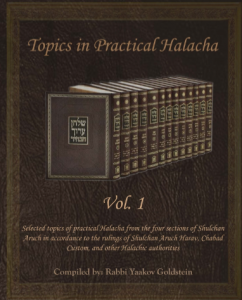Todays Halacha is an excerpt from our Sefer
Buy Here
How long must a widow or divorcee wait to remarry?
A. Not pregnant and not after birth:[1]
All widows and divorcee’s must wait 90 days from after the divorce, or death of the husband, prior to remarrying [Kiddushin/Nissuin].[2] This applies even if the woman is not capable of bearing children, or did not have relations with her husband. The 90 days are counted beginning from the day after the divorce or death of the husband. On the 91st day she may get married.
Shidduchim:[3] The above women may date and become non-Halachicly engaged [no Eirusin] prior to the 90 days.
B. Pregnant or after birth:[4]
The Sages decreed that a divorcee or widow that is pregnant or within 24 months from after birth, must wait until the baby is 24 months old in order to remarry.[5] This applies even if she is no longer nursing her child. The 24 months is counted beginning from the day of birth of the child. After the 24 months pass she may remarry.[6] If there is a double Adar within these 24 months, she is to initially be stringent and not consider it as part of the 24 months, and hence wait a total of 25 months.[7] The above law however carries the following exceptions, in which case she must only wait 90 days as is the law by any other widow or divorcee:
- If the child passed away she may remarry right away, so long as 90 days have passed since the divorce or death of the husband.
- If the child was weaned before the divorce or death, she may remarry right away, so long as 90 days have passed since the divorce or death.
- If her milk dried up before the divorce or death, she may remarry right away, so long as 90 days have passed since the divorce or death.
_____________________________________________________________________________________________________
[1] Michaber 13/1; Mishneh Yevamos 41a
[2] The reason: This wait is necessary in order to determine if the woman became pregnant from her previous husband. [Michaber ibid]
[3] Rama 13/1; Beis Yosef 13 in name of Teshuvas Harosh; Terumas Hadeshen 217
[4] Michaber 13/11; Yevamos 42a
[5] The reason: The Gemara ibid suggests several reasons for this prohibition, the common denominator of all the reasons is because it can jeopardize the safety of the child: The following are the reasons mentioned: a) If she becomes pregnant again from the second husband during her current pregnancy it could mutate and injure the child of the first pregnancy. [This is physically possible, and is called superfetation. Its last recorded occurrence was in 2009 by a couple in Arkansas who became pregnant with a second child several weeks after her first pregnancy.] b) The intercourse of the second husband may injure the child through pressing too much on him. 3) She may become pregnant during nursing, which will diminish her milk and jeopardize the health of the child. The Gemara negates the first two reasons and accepts the third reason as the final reason, and so write Beis Shmuel 13/20. The Rambam however records the second reason-see Beis Shmuel ibid!
[6] Michaber ibid
[7] Rama ibid



Leave A Comment?
You must be logged in to post a comment.